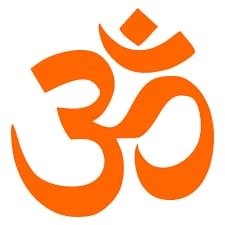Hinduism: Difference between revisions
No edit summary Tags: Reverted Visual edit: Switched |
No edit summary Tags: Manual revert Visual edit: Switched |
||
| Line 1: | Line 1: | ||
{{#seo: | {{#seo: | ||
|title=Hinduism | |title=Hinduism – Beliefs, History, Practices, and Global Influence | ||
|description=Hinduism, one of the world’s oldest religions | |description=Discover the beliefs, sacred texts, practices, and worldwide impact of Hinduism, one of the world’s oldest religions rooted in the Indian subcontinent. | ||
|keywords=Hinduism | |keywords=Hinduism, Sanatana Dharma, Vedas, Bhagavad Gita, Dharma, Karma, Moksha, Indian religion, Hindu beliefs, Hindu philosophy | ||
|image= | |image=Om_symbol.jpeg | ||
}} | |||
{{Infobox religion | |||
}}{{Infobox religion | |||
| name = Hinduism | | name = Hinduism | ||
| image = Om_symbol.jpeg | | image = Om_symbol.jpeg | ||
| Line 25: | Line 21: | ||
| motto = "Truth is one, paths are many" (Ekam Sat Vipra Bahudha Vadanti) | | motto = "Truth is one, paths are many" (Ekam Sat Vipra Bahudha Vadanti) | ||
| website = https://hindupedia.com | | website = https://hindupedia.com | ||
}}'''Hinduism''' is one of the world’s oldest religions, originating in the Indian subcontinent around 1500 BCE or earlier. It is a complex, diverse, and pluralistic tradition with no single founder or unified scripture. Hinduism is the third-largest religion in the world, with over a billion adherents, primarily in [[India]] and [[Nepal]]. | }} | ||
'''Hinduism''' is one of the world’s oldest religions, originating in the Indian subcontinent around 1500 BCE or earlier. It is a complex, diverse, and pluralistic tradition with no single founder or unified scripture. Hinduism is the third-largest religion in the world, with over a billion adherents, primarily in [[India]] and [[Nepal]].<ref>https://www.britannica.com/topic/Hinduism</ref> | |||
== Beliefs and Philosophy == | == Beliefs and Philosophy == | ||
| Line 35: | Line 32: | ||
* '''Moksha''' – liberation from the cycle of rebirth | * '''Moksha''' – liberation from the cycle of rebirth | ||
Hindus believe in a supreme reality called '''Brahman''', which is eternal and formless but manifests through deities like [[Brahma]], [[Vishnu]], and [[Shiva]]. | Hindus believe in a supreme reality called '''Brahman''', which is eternal and formless but manifests through deities like [[Brahma]], [[Vishnu]], and [[Shiva]].<ref>https://www.bbc.co.uk/religion/religions/hinduism/beliefs/beliefs_1.shtml</ref> | ||
== Sacred Texts == | == Sacred Texts == | ||
| Line 43: | Line 40: | ||
* '''Smriti''' – "that which is remembered", including the [[Ramayana]], [[Mahabharata]], and the [[Puranas]] | * '''Smriti''' – "that which is remembered", including the [[Ramayana]], [[Mahabharata]], and the [[Puranas]] | ||
The [[Bhagavad Gita]], a part of the Mahabharata, is among the most revered texts. | The [[Bhagavad Gita]], a part of the Mahabharata, is among the most revered texts.<ref>https://www.learnreligions.com/sacred-texts-of-hinduism-1770309</ref> | ||
== Major Denominations == | == Major Denominations == | ||
| Line 53: | Line 50: | ||
* '''Smartism''' – liberal worship of five major deities | * '''Smartism''' – liberal worship of five major deities | ||
Each tradition has its unique practices, philosophies, and scriptures. | Each tradition has its unique practices, philosophies, and scriptures.<ref>https://www.britannica.com/topic/Hinduism/Sects-and-cults</ref> | ||
== Practices == | == Practices == | ||
| Line 61: | Line 58: | ||
* '''Yoga''' and meditation | * '''Yoga''' and meditation | ||
* '''Pilgrimage''' to sacred sites | * '''Pilgrimage''' to sacred sites | ||
* '''Observance of festivals''' such as [[Diwali]], [[Holi]], and [[Navaratri]] | * '''Observance of festivals''' such as [[Diwali]], [[Holi]], and [[Navaratri]]<ref>https://www.bbc.co.uk/religion/religions/hinduism/holydays/holi.shtml</ref> | ||
== Influence == | == Influence == | ||
| Line 67: | Line 64: | ||
== Global Presence == | == Global Presence == | ||
In addition to India and Nepal, large Hindu communities exist in [[Mauritius]], [[Bali (Indonesia)]], [[Trinidad and Tobago]], [[Fiji]], the [[United States]], and the [[United Kingdom]]. | In addition to India and Nepal, large Hindu communities exist in [[Mauritius]], [[Bali (Indonesia)]], [[Trinidad and Tobago]], [[Fiji]], the [[United States]], and the [[United Kingdom]].<ref>https://en.wikipedia.org/wiki/Hindu_diaspora</ref> | ||
== See Also == | == See Also == | ||
| Line 82: | Line 79: | ||
[[Category:Articles needing more references]] | [[Category:Articles needing more references]] | ||
[[Category:Articles needing infobox]] | [[Category:Articles needing infobox]] | ||
Revision as of 12:50, 18 August 2025
| Hinduism | |
|---|---|

| |
| The "Om" – sacred sound and spiritual icon | |
| Founder | Not attributed to a single founder |
| Founded | Prehistoric to ~1500 BCE (Indus Valley Civilization and Vedic period) |
| Place of origin | Indian subcontinent |
| Scriptures | Vedas, Upanishads, Bhagavad Gita, Ramayana, Mahabharata |
| Key beliefs | Dharma, Karma, Moksha, Reincarnation, Atman, Brahman |
| Practices | Puja, meditation, yoga, chanting, pilgrimage, rituals |
| Ultimate goal | Moksha (liberation from samsara) |
| Followers | ~1.2 billion |
| Major sects | Shaivism, Vaishnavism, Shaktism, Smartism |
| Symbols | Om, Swastika, Trishula, Lotus |
| Motto | "Truth is one, paths are many" (Ekam Sat Vipra Bahudha Vadanti) |
| Website | https://hindupedia.com |
Hinduism is one of the world’s oldest religions, originating in the Indian subcontinent around 1500 BCE or earlier. It is a complex, diverse, and pluralistic tradition with no single founder or unified scripture. Hinduism is the third-largest religion in the world, with over a billion adherents, primarily in India and Nepal.[1]
Beliefs and Philosophy
Hinduism is centered around key philosophical concepts such as:
- Dharma – righteous duty or moral order
- Karma – law of cause and effect
- Samsara – cycle of birth, death, and rebirth
- Moksha – liberation from the cycle of rebirth
Hindus believe in a supreme reality called Brahman, which is eternal and formless but manifests through deities like Brahma, Vishnu, and Shiva.[2]
Sacred Texts
Hindu scriptures are broadly divided into:
- Shruti – "that which is heard", including the four Vedas and the Upanishads
- Smriti – "that which is remembered", including the Ramayana, Mahabharata, and the Puranas
The Bhagavad Gita, a part of the Mahabharata, is among the most revered texts.[3]
Major Denominations
Hinduism includes several major sects:
- Vaishnavism – worship of Vishnu and his avatars like Krishna and Rama
- Shaivism – worship of Shiva
- Shaktism – worship of the goddess (Shakti or Devi)
- Smartism – liberal worship of five major deities
Each tradition has its unique practices, philosophies, and scriptures.[4]
Practices
Common practices include:
- Puja (ritual worship)
- Yoga and meditation
- Pilgrimage to sacred sites
- Observance of festivals such as Diwali, Holi, and Navaratri[5]
Influence
Hinduism has had a profound impact on Indian art, culture, architecture, and law. It also gave rise to other religions like Buddhism, Jainism, and Sikhism.[6]
Global Presence
In addition to India and Nepal, large Hindu communities exist in Mauritius, Bali (Indonesia), Trinidad and Tobago, Fiji, the United States, and the United Kingdom.[7]
See Also
References
- ↑ https://www.britannica.com/topic/Hinduism
- ↑ https://www.bbc.co.uk/religion/religions/hinduism/beliefs/beliefs_1.shtml
- ↑ https://www.learnreligions.com/sacred-texts-of-hinduism-1770309
- ↑ https://www.britannica.com/topic/Hinduism/Sects-and-cults
- ↑ https://www.bbc.co.uk/religion/religions/hinduism/holydays/holi.shtml
- ↑ https://www.history.com/topics/religion/hinduism
- ↑ https://en.wikipedia.org/wiki/Hindu_diaspora

